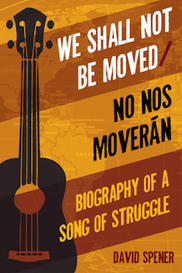We Shall Not Be Moved/No nos moverán
The activist anthem "We Shall Not Be Moved" expresses resolve in the face of adversity; it helps members of social movements persevere in their struggles to build a better world. The exact origins of the song are unknown, but it appears to have begun as a Protestant revival song sung by rural whites and African slaves in the southeastern United States in the early nineteenth century. The song was subsequently adopted by U.S. labor and civil rights activists, students and workers opposing the Franco dictatorship in Spain, and by Chilean supporters of that country's socialist government in the early 1970s.
In this fascinating biography, David Spener details the history and the role the song has played in each of the movements in which it has been sung. He analyzes its dissemination, function, and meaning through a number of different sociological and anthropological lenses to explore how songs can serve as an invaluable resource to participants in movements for social change.
Click on links below to access photos, videos, and other content related to selected chapters from the book.
Please report any problems with the website to dspener@trinity.edu.
